The adoption of renewable energy sources, particularly solar power, has significantly increased as the world strives for a more sustainable future. However, the intermittency of solar power remains a challenge to its widespread use. To address this issue, House battery storage with inverter: AC Coupling Battery has emerged as a solution. AC Coupling Battery is gaining popularity globally due to economic, technical, and political regulatory reasons. It can be connected to the grid or used as a backup power system, making it a valuable addition to grid-connected or hybrid PV systems that previously only utilized LiFePO4 battery banks in off-grid systems. 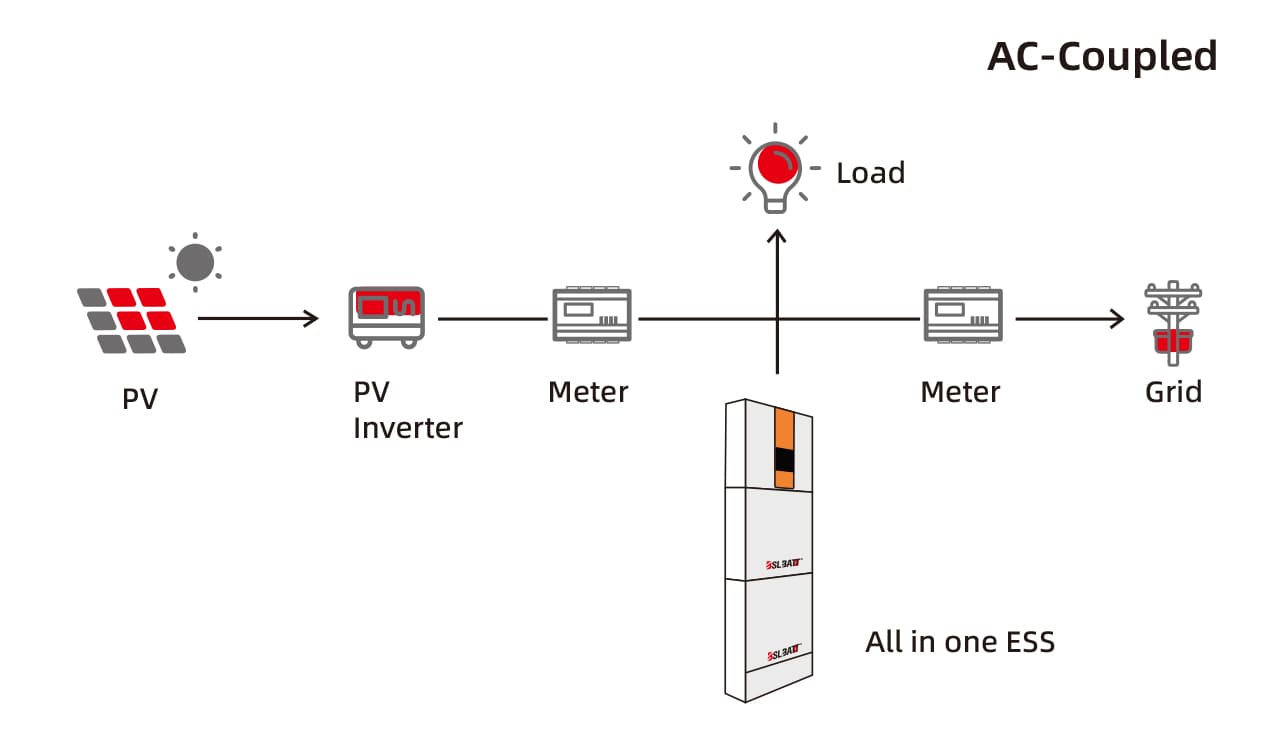 Many lithium battery manufacturers have developed ac coupled battery storage solutions, including inverters and solar lithium battery banks with BMS, allowing for more seamless integration of AC Coupling Batteries into PV systems. This article will provide an in-depth look at AC Coupling batteries, including their benefits, working principles, factors to consider when selecting a system, and installation and maintenance tips. What is AC Coupling Battery? AC Coupling Battery is a system that enables homeowners to store excess solar energy in a battery system, which can be used to power their homes during periods of low sunlight or grid outages. Unlike DC Coupling Battery, which stores DC power directly from the solar panels, AC Coupling Battery converts the DC power produced by solar panels into AC power, which can be stored in the battery system. This is a house battery storage knowledge supplement: DC or AC Coupled Battery Storage? How Should You Decide? One of the main advantages of AC Coupling Battery is that it allows homeowners to add battery storage to their existing solar panel system without the need for additional hardware. This makes AC Coupling Batteries a cost-effective solution for homeowners who want to increase their energy independence. An AC-coupled battery system can be a system that operates in two different modes: on-grid or off-grid. AC-coupled battery systems are already a reality on any conceivable scale: from micro-generation to centralized power generation, such systems will make the long-awaited energy independence of consumers possible. In centralized power generation, so-called BESS (Battery Energy Storage Systems) are already used, which regulate the intermittency of energy generation and help to control the stability of the power system or reduce the LCOE (Levelised Cost of Energy) of photovoltaic and wind power plants. At the micro or small power generation level such as residential solar systems, AC-coupled battery systems can perform a variety of function: ● Providing better energy management in the home, avoiding the injection of energy into the grid and giving priority to self-generation. ● Providing security for commercial installations through backup functions or by reducing demand during peak consumption periods. ● Reducing energy costs through energy transfer strategies (storing and injecting energy at predetermined times). ● Among other possible functions. Given the complexity of AC-coupled battery systems, which require inverters with different characteristics and operating modes, with the exception of house battery storage which requires complex BMS systems, AC-coupled battery systems are currently in the market entry phase; this may be more or less advanced in different countries. As early as 2021, BSLBATT Lithium pioneered the all-in-one AC-coupled battery storage, which can be used for home solar storage systems or as a backup power!
Many lithium battery manufacturers have developed ac coupled battery storage solutions, including inverters and solar lithium battery banks with BMS, allowing for more seamless integration of AC Coupling Batteries into PV systems. This article will provide an in-depth look at AC Coupling batteries, including their benefits, working principles, factors to consider when selecting a system, and installation and maintenance tips. What is AC Coupling Battery? AC Coupling Battery is a system that enables homeowners to store excess solar energy in a battery system, which can be used to power their homes during periods of low sunlight or grid outages. Unlike DC Coupling Battery, which stores DC power directly from the solar panels, AC Coupling Battery converts the DC power produced by solar panels into AC power, which can be stored in the battery system. This is a house battery storage knowledge supplement: DC or AC Coupled Battery Storage? How Should You Decide? One of the main advantages of AC Coupling Battery is that it allows homeowners to add battery storage to their existing solar panel system without the need for additional hardware. This makes AC Coupling Batteries a cost-effective solution for homeowners who want to increase their energy independence. An AC-coupled battery system can be a system that operates in two different modes: on-grid or off-grid. AC-coupled battery systems are already a reality on any conceivable scale: from micro-generation to centralized power generation, such systems will make the long-awaited energy independence of consumers possible. In centralized power generation, so-called BESS (Battery Energy Storage Systems) are already used, which regulate the intermittency of energy generation and help to control the stability of the power system or reduce the LCOE (Levelised Cost of Energy) of photovoltaic and wind power plants. At the micro or small power generation level such as residential solar systems, AC-coupled battery systems can perform a variety of function: ● Providing better energy management in the home, avoiding the injection of energy into the grid and giving priority to self-generation. ● Providing security for commercial installations through backup functions or by reducing demand during peak consumption periods. ● Reducing energy costs through energy transfer strategies (storing and injecting energy at predetermined times). ● Among other possible functions. Given the complexity of AC-coupled battery systems, which require inverters with different characteristics and operating modes, with the exception of house battery storage which requires complex BMS systems, AC-coupled battery systems are currently in the market entry phase; this may be more or less advanced in different countries. As early as 2021, BSLBATT Lithium pioneered the all-in-one AC-coupled battery storage, which can be used for home solar storage systems or as a backup power! 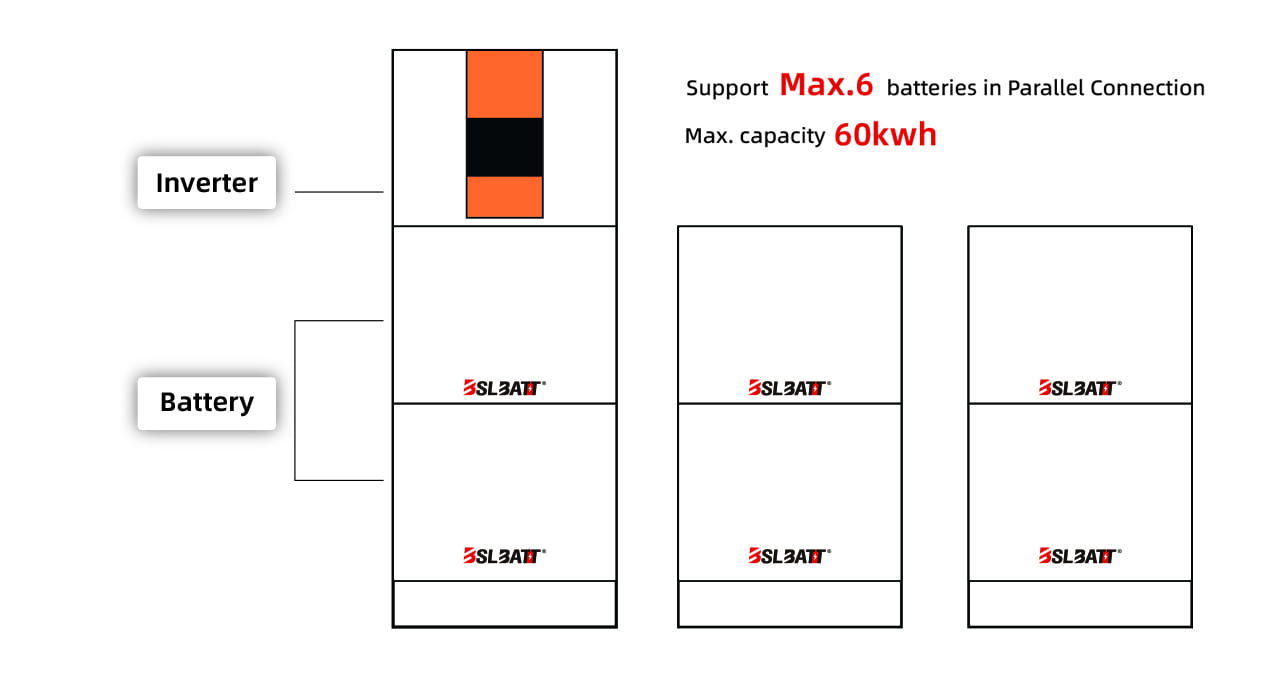 Advantages of AC Coupling Battery Compatibility: One of the biggest advantages of AC Coupling batteries is that they are compatible with both existing and new solar PV systems. This makes it easy to integrate AC Coupling batteries with your solar PV system without having to make any significant changes to the existing setup. Flexible use: AC Coupling batteries are flexible in terms of how they can be used. They can be connected to the grid or used as a backup power source in case of power outages. This flexibility makes them ideal for homeowners who want to reduce their reliance on the grid and have access to a reliable backup power source. Improved battery life: AC-coupled systems have a longer lifespan than DC-coupled systems because they use standard AC wiring and do not require expensive DC-rated equipment. This means that they can provide long-term cost savings for homeowners or businesses. Monitoring: AC-coupled battery systems can be easily monitored using the same software as the solar PV system. This allows for easier management of the entire energy system from a single platform. Safety: AC-coupled battery systems are generally considered to be safer than DC-coupled systems, as they use standard AC wiring and are less prone to voltage mismatches, which can be a safety hazard. How Does AC Coupling Battery Work? AC-coupled battery systems work by connecting a battery inverter to the AC side of an existing solar PV system. The battery inverter converts the DC electricity generated by the solar panels into AC electricity that can be used to power the home or business, or fed back into the grid. When excess energy is generated by the solar panels, it is directed to the battery for storage. The battery then stores this excess energy until it is needed, such as during times when the sun is not shining or energy demand is high. During these times, the battery releases the stored energy back into the AC system, providing additional power to the home or business. In an AC-coupled battery system, the battery inverter is connected to the AC bus of the existing solar PV system. This allows the battery to be integrated into the system without requiring any modifications to the existing solar panels or inverter.
Advantages of AC Coupling Battery Compatibility: One of the biggest advantages of AC Coupling batteries is that they are compatible with both existing and new solar PV systems. This makes it easy to integrate AC Coupling batteries with your solar PV system without having to make any significant changes to the existing setup. Flexible use: AC Coupling batteries are flexible in terms of how they can be used. They can be connected to the grid or used as a backup power source in case of power outages. This flexibility makes them ideal for homeowners who want to reduce their reliance on the grid and have access to a reliable backup power source. Improved battery life: AC-coupled systems have a longer lifespan than DC-coupled systems because they use standard AC wiring and do not require expensive DC-rated equipment. This means that they can provide long-term cost savings for homeowners or businesses. Monitoring: AC-coupled battery systems can be easily monitored using the same software as the solar PV system. This allows for easier management of the entire energy system from a single platform. Safety: AC-coupled battery systems are generally considered to be safer than DC-coupled systems, as they use standard AC wiring and are less prone to voltage mismatches, which can be a safety hazard. How Does AC Coupling Battery Work? AC-coupled battery systems work by connecting a battery inverter to the AC side of an existing solar PV system. The battery inverter converts the DC electricity generated by the solar panels into AC electricity that can be used to power the home or business, or fed back into the grid. When excess energy is generated by the solar panels, it is directed to the battery for storage. The battery then stores this excess energy until it is needed, such as during times when the sun is not shining or energy demand is high. During these times, the battery releases the stored energy back into the AC system, providing additional power to the home or business. In an AC-coupled battery system, the battery inverter is connected to the AC bus of the existing solar PV system. This allows the battery to be integrated into the system without requiring any modifications to the existing solar panels or inverter. 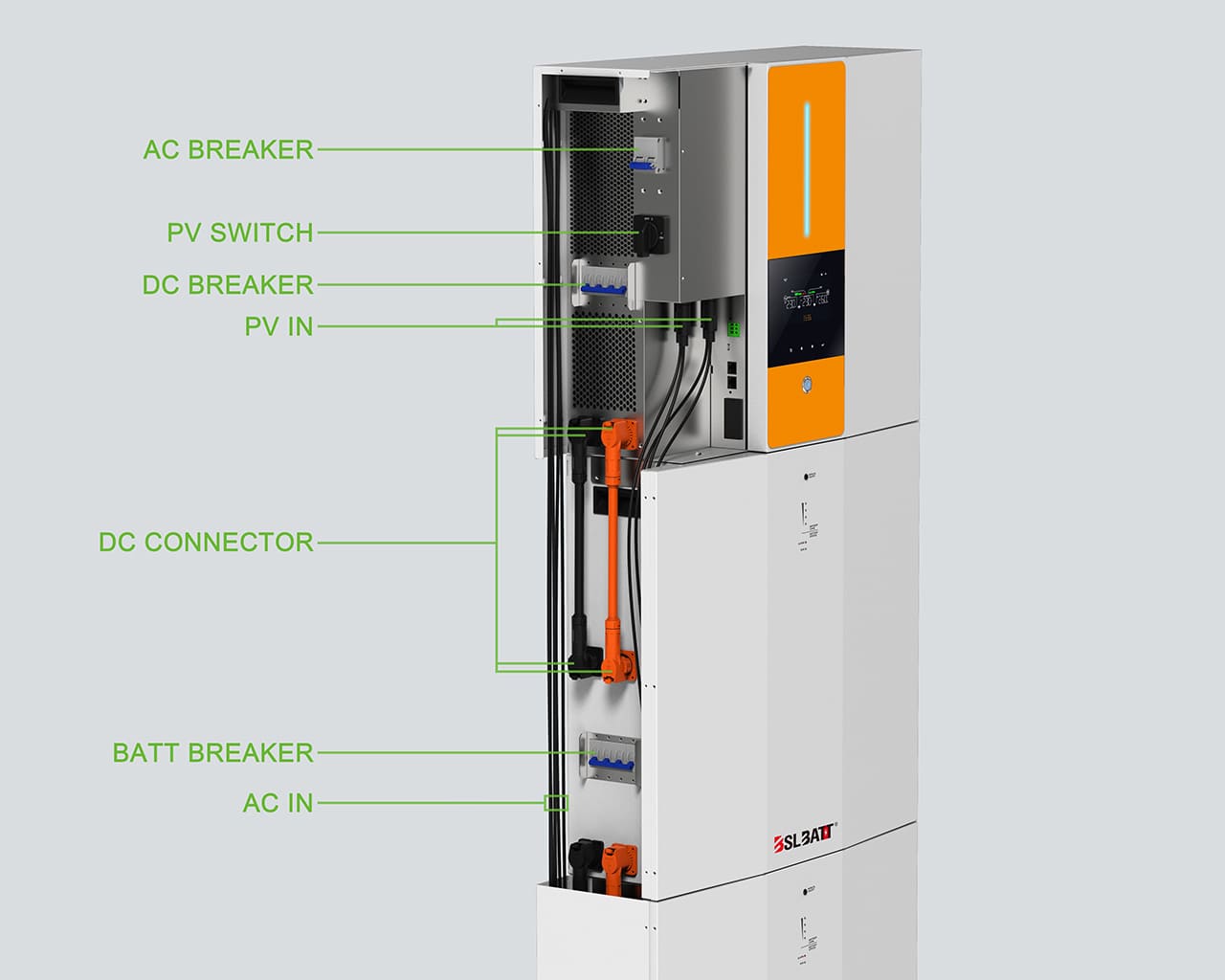 The ac coupled inverter also performs a number of other functions, such as monitoring the battery’s state of charge, protecting the battery from overcharging or over-discharging, and communicating with other components of the energy system. Factors to Consider when Choosing an AC Coupling Battery System System size: The size of the AC-coupled battery system should be chosen based on the energy demands of the home or business, as well as the capacity of the existing solar PV system. A professional installer can perform a load analysis and recommend a system size that is appropriate for the specific energy needs. Energy needs: The user should consider their energy needs and usage patterns when selecting an AC-coupled battery system. This will help ensure that the system is appropriately sized and can provide the necessary amount of energy to power their home or business. Battery capacity: The user should consider the capacity of the battery, which refers to the amount of energy that can be stored and used when needed. A larger capacity battery can provide more backup power during outages and allow for greater energy independence. Battery lifespan: The user should consider the expected lifespan of the battery, which can vary depending on the type of battery used. A longer lifespan battery may be more expensive upfront but can ultimately provide better long-term value. Installation and maintenance: The user should consider the installation and maintenance requirements of the AC-coupled battery system. Some systems may require more frequent maintenance or be more difficult to install, which can impact the overall cost and convenience of the system. Cost: The user should consider the upfront cost of the system, including the battery, inverter, and installation fees, as well as any ongoing maintenance costs. They should also consider potential cost savings over time, such as reduced energy bills or incentives for using renewable energy. Backup power: The user should consider whether backup power is important to them, and if so, whether the AC-coupled battery system is designed to provide backup power during outages. Warranty and support: The user should consider the warranty and support options provided by the manufacturer or installer, which can impact the reliability and longevity of the system. Installation and Maintenance Tips of Ac Coupled Battery Storage Installation and maintenance of an AC-coupled battery system require careful attention to ensure safe and reliable operation. Here are some general guidelines for installing and maintaining an AC-coupled battery system from a professional point of view: Installation: Choose an appropriate location: The installation location should be well-ventilated and away from direct sunlight, heat sources, and flammable materials. The battery system should also be protected from extreme temperatures and moisture. Install the inverter and battery: The inverter and battery should be installed according to the manufacturer’s instructions, with proper grounding and electrical connections. Connect to the grid: The AC-coupled battery system should be connected to the grid through a certified electrician, in compliance with local codes and regulations. Maintenance: Regularly monitor the battery status: The battery status should be checked regularly, including the charge level, temperature, and voltage, to ensure that it is operating safely and efficiently. Perform routine maintenance: Routine maintenance may include cleaning the battery terminals, checking the battery cables and connections, and performing any necessary firmware updates. Follow manufacturer guidelines: The user should follow the manufacturer’s guidelines for maintenance and inspection, which may vary depending on the type of battery and inverter used. Replace battery if necessary: Over time, the battery may lose its capacity and require replacement. The user should consider the manufacturer’s recommended battery lifespan and plan for replacement accordingly. Regularly test the backup power: If the AC-coupled battery system is designed to provide backup power during outages, the user should periodically test the system to ensure that it is working properly. Overall, installation and maintenance of an AC-coupled battery system require careful attention to ensure safe and reliable operation. It is recommended to consult with a certified installer or electrician and follow the manufacturer’s guidelines for installation and maintenance. Grab the Direction of the Market we are now living in an era where house battery storage systems are showing their potential. Ac coupled solar batteries for houses will also become the standard for homes worldwide in the coming years, and this is already becoming common in some countries, such as Australia and the USA. Ac coupled solar battery systems for houses can benefit consumers by reducing their electricity bills (by storing energy for consumption at peak times) or by avoiding injecting energy into grid injections if the benefits of a distributed generation credit compensation system are reduced (by charging a fee). In other words, a backup battery for houses would make possible the long-awaited energy independence of consumers without the constraints or restrictions imposed by electricity industry companies or regulators. Basically, two types of AC-coupled battery systems can be found on the market: multi-port inverters with an energy input (e.g. solar PV) and backup batteries for home; or systems that integrate components in a modular way, as shown in the diagram below.
The ac coupled inverter also performs a number of other functions, such as monitoring the battery’s state of charge, protecting the battery from overcharging or over-discharging, and communicating with other components of the energy system. Factors to Consider when Choosing an AC Coupling Battery System System size: The size of the AC-coupled battery system should be chosen based on the energy demands of the home or business, as well as the capacity of the existing solar PV system. A professional installer can perform a load analysis and recommend a system size that is appropriate for the specific energy needs. Energy needs: The user should consider their energy needs and usage patterns when selecting an AC-coupled battery system. This will help ensure that the system is appropriately sized and can provide the necessary amount of energy to power their home or business. Battery capacity: The user should consider the capacity of the battery, which refers to the amount of energy that can be stored and used when needed. A larger capacity battery can provide more backup power during outages and allow for greater energy independence. Battery lifespan: The user should consider the expected lifespan of the battery, which can vary depending on the type of battery used. A longer lifespan battery may be more expensive upfront but can ultimately provide better long-term value. Installation and maintenance: The user should consider the installation and maintenance requirements of the AC-coupled battery system. Some systems may require more frequent maintenance or be more difficult to install, which can impact the overall cost and convenience of the system. Cost: The user should consider the upfront cost of the system, including the battery, inverter, and installation fees, as well as any ongoing maintenance costs. They should also consider potential cost savings over time, such as reduced energy bills or incentives for using renewable energy. Backup power: The user should consider whether backup power is important to them, and if so, whether the AC-coupled battery system is designed to provide backup power during outages. Warranty and support: The user should consider the warranty and support options provided by the manufacturer or installer, which can impact the reliability and longevity of the system. Installation and Maintenance Tips of Ac Coupled Battery Storage Installation and maintenance of an AC-coupled battery system require careful attention to ensure safe and reliable operation. Here are some general guidelines for installing and maintaining an AC-coupled battery system from a professional point of view: Installation: Choose an appropriate location: The installation location should be well-ventilated and away from direct sunlight, heat sources, and flammable materials. The battery system should also be protected from extreme temperatures and moisture. Install the inverter and battery: The inverter and battery should be installed according to the manufacturer’s instructions, with proper grounding and electrical connections. Connect to the grid: The AC-coupled battery system should be connected to the grid through a certified electrician, in compliance with local codes and regulations. Maintenance: Regularly monitor the battery status: The battery status should be checked regularly, including the charge level, temperature, and voltage, to ensure that it is operating safely and efficiently. Perform routine maintenance: Routine maintenance may include cleaning the battery terminals, checking the battery cables and connections, and performing any necessary firmware updates. Follow manufacturer guidelines: The user should follow the manufacturer’s guidelines for maintenance and inspection, which may vary depending on the type of battery and inverter used. Replace battery if necessary: Over time, the battery may lose its capacity and require replacement. The user should consider the manufacturer’s recommended battery lifespan and plan for replacement accordingly. Regularly test the backup power: If the AC-coupled battery system is designed to provide backup power during outages, the user should periodically test the system to ensure that it is working properly. Overall, installation and maintenance of an AC-coupled battery system require careful attention to ensure safe and reliable operation. It is recommended to consult with a certified installer or electrician and follow the manufacturer’s guidelines for installation and maintenance. Grab the Direction of the Market we are now living in an era where house battery storage systems are showing their potential. Ac coupled solar batteries for houses will also become the standard for homes worldwide in the coming years, and this is already becoming common in some countries, such as Australia and the USA. Ac coupled solar battery systems for houses can benefit consumers by reducing their electricity bills (by storing energy for consumption at peak times) or by avoiding injecting energy into grid injections if the benefits of a distributed generation credit compensation system are reduced (by charging a fee). In other words, a backup battery for houses would make possible the long-awaited energy independence of consumers without the constraints or restrictions imposed by electricity industry companies or regulators. Basically, two types of AC-coupled battery systems can be found on the market: multi-port inverters with an energy input (e.g. solar PV) and backup batteries for home; or systems that integrate components in a modular way, as shown in the diagram below. 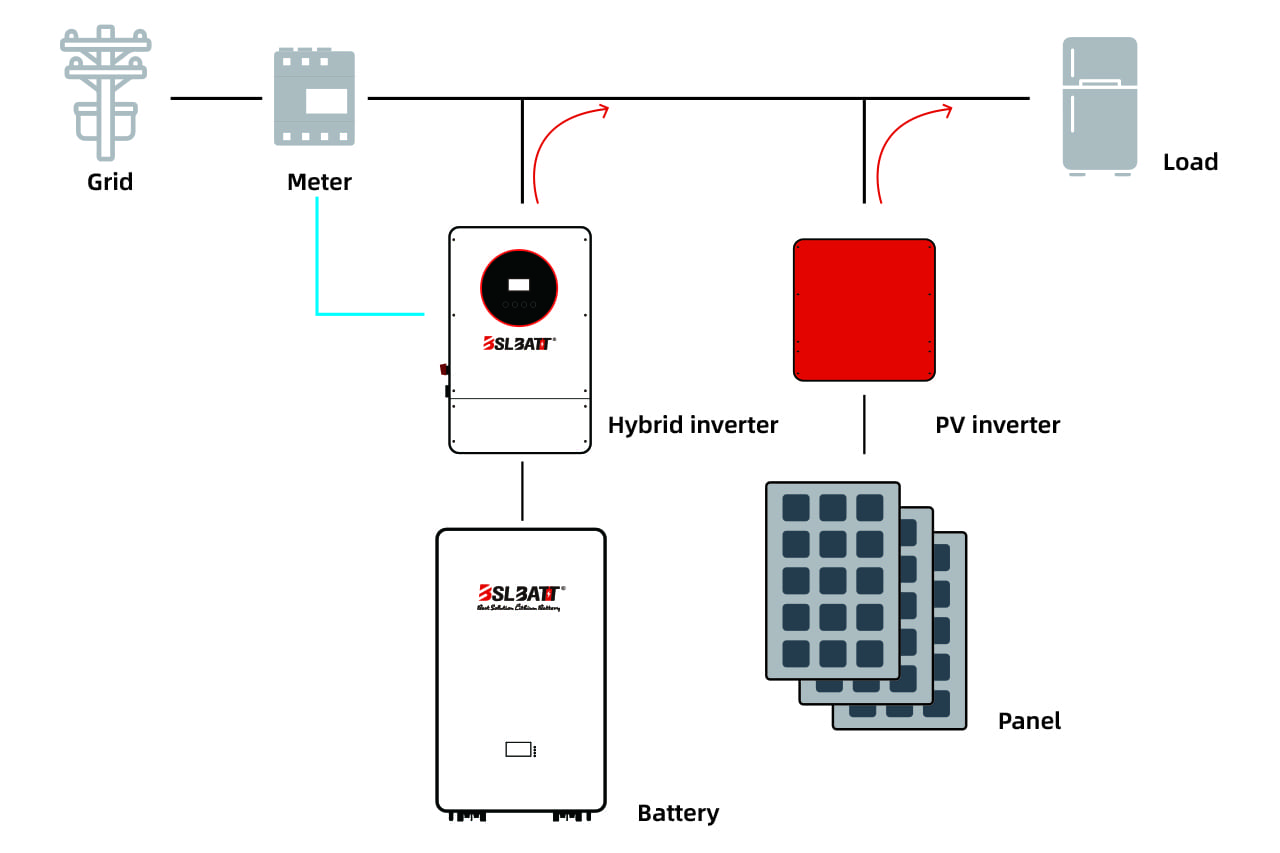 Usually, one or two multi-port inverters are sufficient in homes and small systems. In more demanding or larger systems, the modular solution offered by device integration allows greater flexibility and freedom in sizing the components.
Usually, one or two multi-port inverters are sufficient in homes and small systems. In more demanding or larger systems, the modular solution offered by device integration allows greater flexibility and freedom in sizing the components. 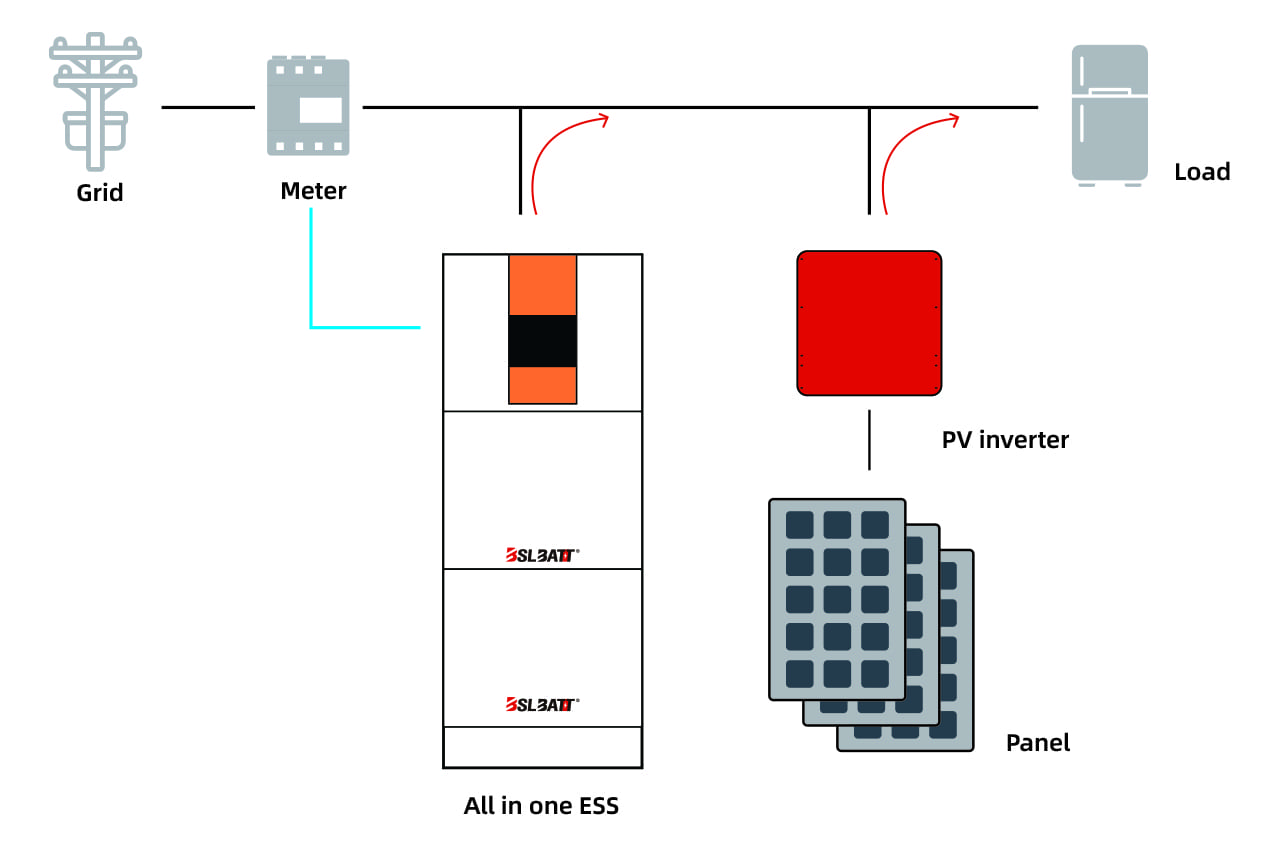 In the diagram above, the AC-coupled system consists of a PV DC/AC inverter (which can have both grid-connected and off-grid outputs, as shown in the example), a battery system (with DC/AC inverter and built-in BMS system) and an integrated panel which creates the connection between the device, the backup battery for home and the consumer load. BSLBATT AC Coupled Battery Storage Solution The BSLBATT All-in-one AC-coupled battery storage solution, which we describe in this document, allows all components to be integrated in a simple and elegant way. The basic house battery storage system consists of a vertical structure that brings together these 2 components: On/off grid solar inverter (top), and the 48V lithium battery bank (bottom). With the expansion function, two modules can be added vertically, and three modules can be added in parallel, each module has a capacity of 10kWh, and the maximum capacity is 60kWh, allowing the number of inverters and battery packs to be expanded left and right according to the needs of each project. The Ac coupled battery storage for home system shown above uses the following BSLBATT components. Inverters of the 5.5kWh series, with a power range of 4.8 kW to 6.6 kW, single phase, with grid-connected and off-grid operation modes. LiFePO4 battery 48V 200Ah Conclusion In conclusion, BSLBATT house battery storage with inverter: AC Coupling Battery offers homeowners a cost-effective solution for storing excess solar energy and increasing their energy independence. AC Coupling Battery systems offer several benefits, including reduced energy bills, increased energy independence, and improved efficiency. When choosing an AC Coupling Battery system, it’s essential to consider battery capacity and energy storage, inverter capacity, and battery type. It’s also essential to hire a licensed and experienced installer and perform regular maintenance to ensure optimal system performance and longevity. By implementing an AC Coupling Battery system, homeowners can reduce their energy bills, increase their energy independence, and contribute to a more sustainable future.
In the diagram above, the AC-coupled system consists of a PV DC/AC inverter (which can have both grid-connected and off-grid outputs, as shown in the example), a battery system (with DC/AC inverter and built-in BMS system) and an integrated panel which creates the connection between the device, the backup battery for home and the consumer load. BSLBATT AC Coupled Battery Storage Solution The BSLBATT All-in-one AC-coupled battery storage solution, which we describe in this document, allows all components to be integrated in a simple and elegant way. The basic house battery storage system consists of a vertical structure that brings together these 2 components: On/off grid solar inverter (top), and the 48V lithium battery bank (bottom). With the expansion function, two modules can be added vertically, and three modules can be added in parallel, each module has a capacity of 10kWh, and the maximum capacity is 60kWh, allowing the number of inverters and battery packs to be expanded left and right according to the needs of each project. The Ac coupled battery storage for home system shown above uses the following BSLBATT components. Inverters of the 5.5kWh series, with a power range of 4.8 kW to 6.6 kW, single phase, with grid-connected and off-grid operation modes. LiFePO4 battery 48V 200Ah Conclusion In conclusion, BSLBATT house battery storage with inverter: AC Coupling Battery offers homeowners a cost-effective solution for storing excess solar energy and increasing their energy independence. AC Coupling Battery systems offer several benefits, including reduced energy bills, increased energy independence, and improved efficiency. When choosing an AC Coupling Battery system, it’s essential to consider battery capacity and energy storage, inverter capacity, and battery type. It’s also essential to hire a licensed and experienced installer and perform regular maintenance to ensure optimal system performance and longevity. By implementing an AC Coupling Battery system, homeowners can reduce their energy bills, increase their energy independence, and contribute to a more sustainable future.
Post time: May-08-2024








